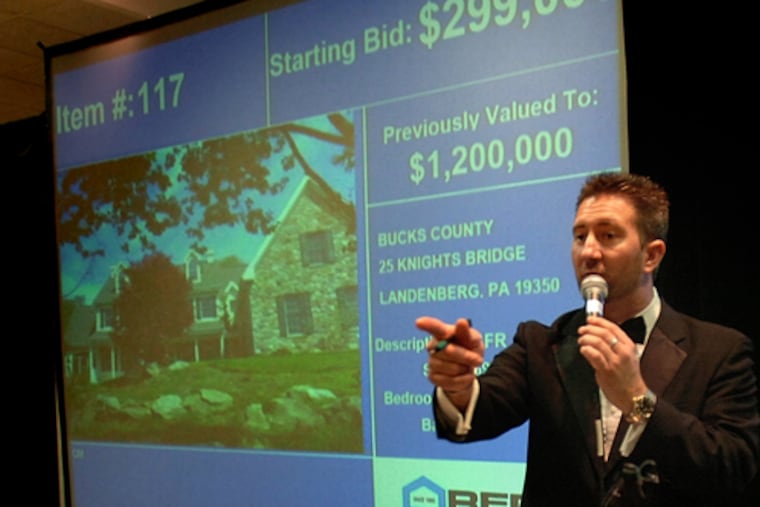Bidding to build their dreams on foreclosures
At an auction yesterday of foreclosed homes, a Queen Village rowhouse valued at $525,000 went for $185,000; a $495,000 duplex in Brooklyn, N.Y., went for $140,000; and a stately five-bedroom stone house in Bucks County, valued at more than a million dollars, sold for $495,000.

At an auction yesterday of foreclosed homes, a Queen Village rowhouse valued at $525,000 went for $185,000; a $495,000 duplex in Brooklyn, N.Y., went for $140,000; and a stately five-bedroom stone house in Bucks County, valued at more than a million dollars, sold for $495,000.
Crowding the hectic and hurried event in Valley Forge were twentysomethings accompanied by their parents, and young couples herding toddlers - many hoping to grab a piece of the homeownership dream at half price. Others said they hoped to rent out the properties or sell at a profit.
With an explosion of foreclosures, this was a banner year for the firm running the auction - REDC, or Real Estate Disposition Corp. Its auctions skyrocketed from about 100 in 2007 to 303 this year, auction staff manager Shannon Wilkes said.
According to its publicist, REDC sold a record 25,500 foreclosed homes this year for a total of $2.9 billion. For each house, the company charges buyers a 5 percent fee.
The bulk of the foreclosures were in Florida, California, Phoenix and Las Vegas, Wilkes said. Philadelphia's real estate bubble never expanded to quite the spectacular proportions it did elsewhere.
Despite frigid weather, more than 300 people converged for the event at the Valley Forge Convention Center, competing for scarce parking spaces with a hugely popular gun show.
More than 100 properties were on the block, with each sale taking just a minute or two. In a machine-gun staccato, the auctioneer called out the bids as pictures of the foreclosed homes appeared on a screen.
Bidders flashed cards as three tuxedo-clad assistants scanning the room noted their bids, keeping up the energy and sense of urgency as they clapped and offered the occasional cheer for the highest offers.
The auctioneer sometimes called out "sold" and sometimes "sold upon approval by seller." Those who needed approval might still be turned down by the banks selling the houses, Wilkes said. Buyers would know within 15 days.
The houses would not be sold if the maximum bid didn't rise past a reserve value, she said, which was higher than the posted opening bids. But about halfway through the action, she said she expected 85 percent of the houses to be sold.
The auctioneer paused for just a second as a grand-looking stone house flashed on the screen. In Landenberg, Chester County, it had five bedrooms and 7,000 square feet of living space. It had been assessed at $1.2 million. The bidding started at $299,000, but within seconds shot above $400,000.
"Four hundred sixty-five, four hundred seventy-five thousand dollars . . . da da da deal. . . . Four hundred and eighty-five," the auctioneer called out.
The bidding happened so fast that it was impossible to tell who was making the offers. "Four hundred ninety thousand dollars. Do we have five hundred? Five hundred? Sold" - for $495,000.
The young couple with the winning bid, looking slightly nervous and surprised, got up from their chairs.
"Right on the spot, we just spent a half-million dollars," said Herb Van Deusen, an engineer from Newark, Del. But it was no impulse purchase.
He and his wife, Nona, who runs an upscale fashion Web site, had been trying to buy this house through a real estate agent, but their $575,000 offer had been turned down.
The couple have toured the spacious interior and thought it would be a nice fit for their family, with a 2-year-old daughter and 8-month-old twins.
Herb Van Deusen said that the house hadn't been lived in for several years and that black mold was growing in the closets. They had gotten an estimate of $8,000 for mold removal.
Many of the properties were in New Jersey or New York. Accountant Zoila Quezade, 25, drove from Queens, N.Y., with her parents to bid on a duplex in Brooklyn originally valued at $495,000. She got it for $140,000 and said she planned to live in half and rent the other out.
Another couple came with their 26-year-old son to bid on a Queen Village townhouse originally valued at $525,000. They bid $185,000 and won. The mother said they had toured the house and liked it, but had been told that there were code violations of some kind; she wasn't sure what. About an hour later, after filling out paperwork, the family members sounded much less enthusiastic, requesting that their names not be used in this article. "We're not even sure we're getting this place," the mother said.
When contacted later in the afternoon, Herb Van Deusen had no buyer's remorse about his $495,000 purchase of the Bucks County house. He had told his real estate agent about his winning bid. "He sounded rather shocked that the deal went through," Van Deusen said.
Even with the mold problem and the 5 percent fee, they saved thousands of dollars. "We feel pretty good about the whole thing at the end."